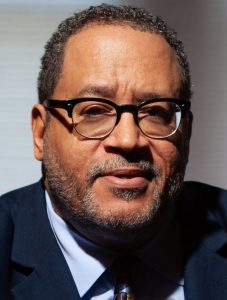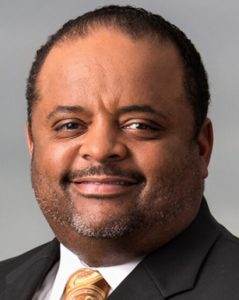Freddie Haynes has been mum on why he abruptly resigned as successor to Jesse Jackson leading the Rainbow PUSH Coalition, but a Chicago columnist is spilling the tea no one wants to talk about.
“The issue is not that Haynes isn’t an eagle; the problem is, too many around Jackson expected Haynes to be a parrot,” wrote Michael Eric Dyson in the Chicago Sun-Times.

Michael Eric Dyson
Dyson, professor of African American and diaspora studies at Vanderbilt University and a professor of ethics and society at Vanderbilt Divinity School, counts himself a friend of Jackson’s. But he contends this is a classic case of a founder being unwilling to give up the reins even when the organization he founded is gasping for life.
“When Haynes agreed to take on the leadership of PUSH, it was, and remains, in financial shambles,” Dyson wrote. “The shoestring budgets and by-the-seat-of-your-pants fundraising were the byproduct of an organization whose greatest achievements were long behind it. The halcyon days of PUSH could be measured in the style of Jackson’s mane and in his sartorial fare. In the ’70s, there was Jackson’s flamboyant ‘fro and the medallions and dashikis he sported as he preached Black pride. In the ’80s and early ’90s, Jackson trimmed his locks, ran for the Oval Office and crossed the brook of racial fire to keep hope alive while donning Brooks Brothers suits.”
In those “halcyon days,” the cash flow to Rainbow PUSH was much stronger than it is today, the professor reported.
BNG was not able to ascertain the financial status of Rainbow PUSH Coalition. Even though it bills itself as a 501(c)(3), the IRS website does not list any registered organization by that name. The Citizenship Education Fund Inc., based in Chicago, appears to be a related organization. Its most recent Form 990 filed on the IRS website is from 2021, and that shows annual income of $3.6 million — down from $5.9 million the year before. In 2021, expenses exceeded revenue by $368,000.

Roland Martin
Roland Martin, journalist and CEO of Black Star Network, told Chicago’s CBS 2 Haynes did not have the autonomy to lead the organization as Jackson’s successor: “You had the friction there. He did not have the full authority to actually do the job.”
Martin added: “You can’t continue to frankly have the reins of an organization when you turn it over to somebody else. That’s really what you had here.”
Haynes was announced last July as Jackson’s hand-picked successor to lead the social justice and voter education coalition. Hayne also serves as pastor of Friendship-West Baptist Church in Dallas. Eight months later, Haynes said he was quitting the second job and didn’t say why.
Dyson and Martin are among the few to say out loud what others have whispered: The powers that be around Jackson were not willing to let go.
“Jackson acolytes and defenders dismissed Haynes’ skills and dedication and subtly implied he wasn’t up to the job,” Dyson wrote. “Such jabs are not only harsh but unprincipled. Renowned political strategist Delmarie Cobb suggested that Jackson, despite failing health, remained on a mission and implied that Haynes lacked the commitment to make it a go. Yet PUSH picked Haynes because his passion for social justice might help the group soar again.”
Dyson added: “To seemingly blame Haynes for these seismic shifts in the tectonic plates of culture and finance is, quite frankly, ridiculous. The man had little to go on, and even if he had decamped from Dallas and pitched his tent at PUSH, the frayed coalition may never have become flush again because the drought has dried up so many reserves.”
“Haynes faced a perhaps more daunting task: succeeding a man who many didn’t want succeeded.”
Further, “Haynes faced a perhaps more daunting task: succeeding a man who many didn’t want succeeded, making it impossible for Haynes to succeed. The cult of personality attached to charismatic leaders is not unfamiliar in Black America. From Marcus Garvey to Malcolm X, from Elijah Muhammad to Martin Luther King Jr., we have known the incredible heights scaled by great men, even as we have witnessed the perils of hyping their persona above the organizations and institutions they build, inherit and leave behind.”
“The hard truth is many around Jackson don’t want him to relinquish power, even to a figure like Haynes, who to this day adores Jackson and has not a bad word to say about him,” Dyson wrote. “The succession of men who have paraded through PUSH as would-be successors to Jackson testifies to the inability to surrender authority for the good of the group.”
How to address the issue is so thorny that the Dallas Morning News, Haynes’ hometown newspaper, ran a front-page article last Sunday that purported to tell why Haynes quit but offered no explanation other than the fact that there was no public explanation.
Jackson, now 82 and diagnosed with Parkinson’s disease, has been the iconic face of the movement for decades.
Rainbow PUSH Coalition’s website lists no board of directors but does list Tricia “CK” Hoffler as chair. Hoffler is an Atlanta-based trial lawyer.
Related article:
Haynes to succeed Jackson as leader of Rainbow PUSH Coalition


